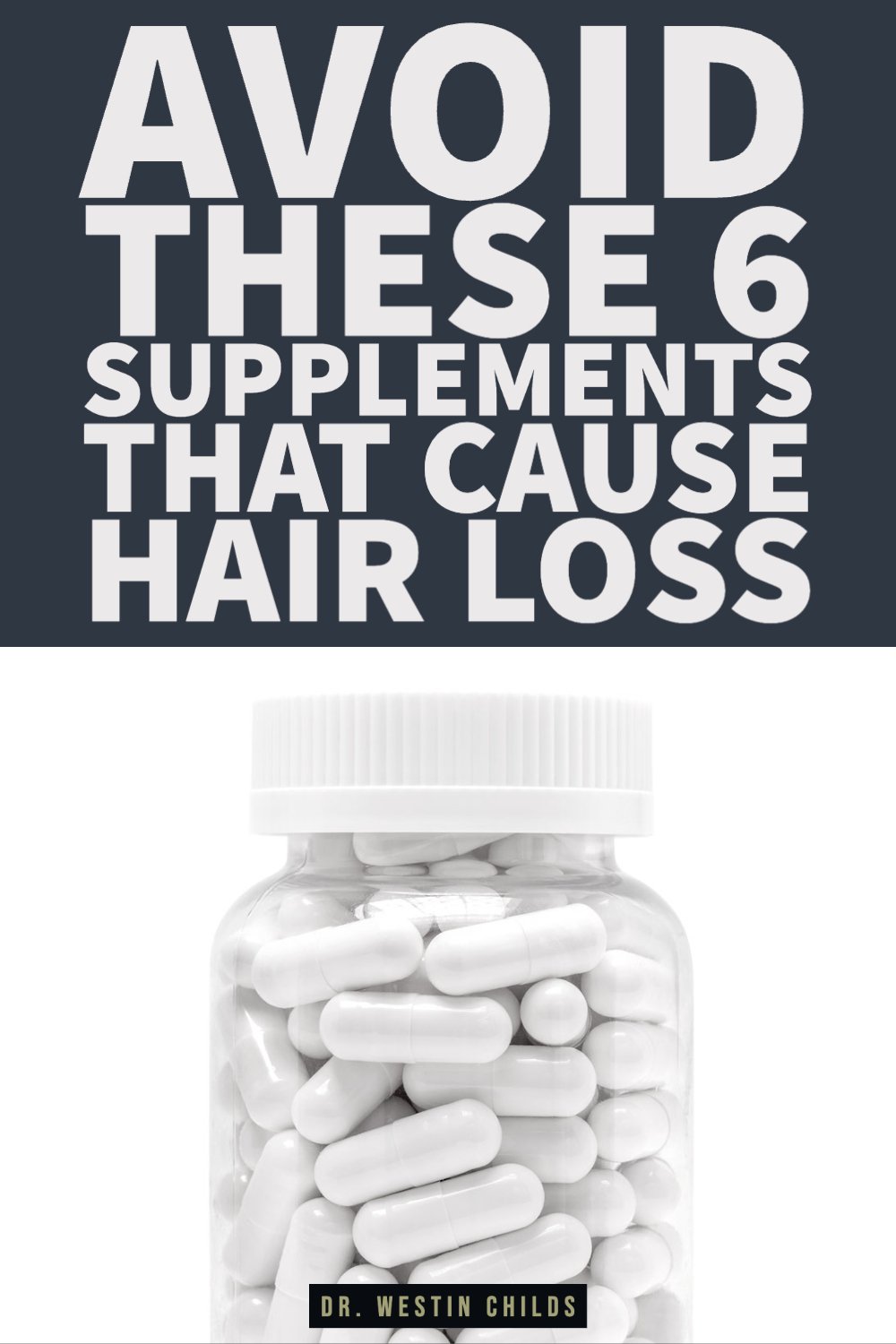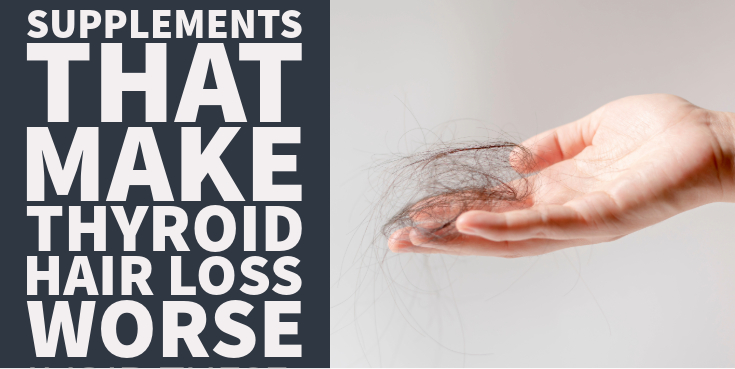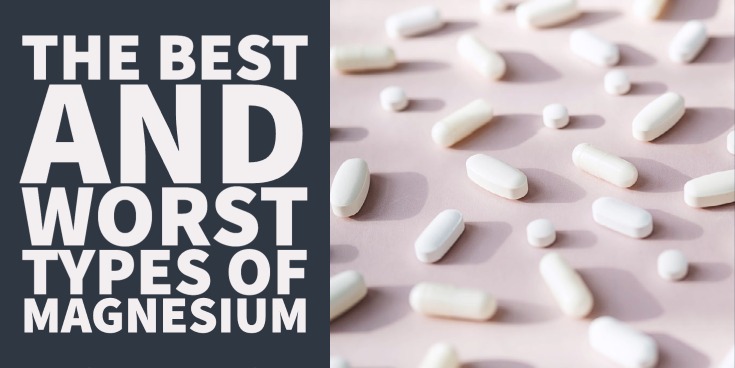Some of the best supplements for hair growth also have the potential to trigger hair loss if they are used incorrectly.
There’s this idea that people with hair loss get that if something worked well then maybe more of that thing will work even better.
This leads people, especially thyroid patients, to take higher and higher doses of supplements that can help with hair regrowth but may start to trigger hair loss when their doses get too high.
Let’s make sure that doesn’t happen to you by talking about how much you should be taking so you avoid triggering hair loss when you want the opposite.
We’re going to be talking about 6 different supplements that can trigger thyroid hair loss (or make it worse) starting now:
#1. Creatine
Creatine has a ton of great benefits for thyroid patients which is why opt to use it.
Ranging from things like supporting muscle growth to treating depression, creatine is much more than just a bodybuilding supplement.
As I’ve discussed the use of creatine in thyroid patients (you can read more about why I recommend it here), there’s something that is always brought up as an objection:
Doesn’t creatine cause hair loss?
Sort of, but not exactly…
There is a common misconception that taking creatine will cause hair loss but that’s not actually true (1).
What is true is that some of the activities that people do when USING creatine may contribute to hair loss.
And that’s because many people who use creatine use it in conjunction with resistance training.
Resistance training is something that can increase testosterone levels (2) and, therefore, contribute to hair loss.
But it’s not the creatine causing the problem, it’s the activities that are associated with the use of creatine.
Even though the existing evidence does not support the idea that creatine causes hair loss, there are still anecdotal reports that it can.
So if you’re really concerned about hair loss then you might want to skip using creatine but only if you already have a specific type of hair loss called androgenetic alopecia.
This is the hair loss that causes male patterned baldness and occurs in both men and women and is one type of hair loss that can occur in thyroid patients.
If you have this problem then skipping out on creatine entirely may make the most sense.
Otherwise, don’t stress about using it, even if you have other types of hair loss like telogen effluvium (diffuse hair loss) or alopecia areata (autoimmune hair loss).
DOWNLOAD FREE RESOURCES
Foods to Avoid if you Have Thyroid Problems:
I’ve found that these 10 foods cause the most problems for thyroid patients. Learn which foods you should avoid if you have thyroid disease of any type.
The Complete List of Thyroid Lab tests:
The list includes optimal ranges, normal ranges, and the complete list of tests you need to diagnose and manage thyroid disease correctly!
#2. Excessive Use of Selenium
Selenium is known to be a powerhouse supplement for thyroid patients.
Not only does it protect the thyroid gland from oxidative stress, but it also supports the creation of the most powerful thyroid hormone (T3).
It’s no wonder, then, that many thyroid patients turn to it to support their hair loss.
There’s one big problem with it though:
If used incorrectly, it can actually make hair loss worse.
Selenium is very much a Goldilocks type of nutrient where too little can cause hair loss and too much can as well.
The type of hair loss associated with selenium deficiency is telogen effluvium which is hair loss that impacts the entire body.
This happens because your cells can’t protect themselves and ultimately they end up dying which impacts the hair growth cycle.
For this reason, plenty of people, especially those with thyroid problems, use selenium to try and fix the issue.
And while this works very well for a lot of people, it’s really easy to accidentally get into trouble with selenium.
That’s because selenium dosing needs to be in a Goldilocks range.
If you don’t take enough, you won’t get any benefit, and if you take too much, you may experience the signs of selenium toxicity.
And one of the symptoms of selenium toxicity is hair loss.
Unfortunately, it’s a lot easier than you think to accidentally take too much selenium.
The RDA for selenium is set at 55 mcg per day, and you start to reach excessive levels of selenium at 200 mcg per day.
So that’s really only 4 times the RDA.
And there are a lot of people who take upwards of 400 mcg of selenium per day.
For optimal hair growth, your selenium dose should be no more than 100 mcg per day UNLESS you have a thyroid problem.
By the way, this issue with excess selenium ALSO applies to food!
The #1 highest food source of selenium is brazil nuts and each brazil nut can contain anywhere from 6 mcg to 154 mcg of selenium.
This means eating 2-4 Brazil nuts each day may put you over that safety threshold.
If you’re a thyroid patient having issues with hair loss and you’re trying to use selenium to fix it, make sure to check your dose!
It might be that you are simply taking too much.
If you go back in time about 7-8 years, it used to be very common for thyroid practitioners to recommend high doses of selenium (I used to be guilty of this!) so make sure you aren’t following old advice.
#3. Excess Biotin
Again, notice I said excess here because we’re not talking about normal intake, we’re talking about taking way more than you need.
Which, when it comes to biotin-containing supplements, is pretty standard as the dosing is often many multiples of the RDA.
As a thyroid patient with hair loss, there’s a very good chance you’ve already heard about biotin.
There’s a lot of misinformation regarding its impact on thyroid lab tests which is why many thyroid patients opt to avoid it.
But for those who actually understand how it works, they are more than willing to take it to support their hair.
If you aren’t familiar with biotin, though, here’s a quick primer:
Biotin, otherwise known as vitamin B7 (3), is probably one of the most common supplements used to treat hair loss.
There’s conflicting evidence as to whether or not biotin supplements actually help with hair growth (4) but let’s put that aside for a second.
The reality is that there are tons of people, including those with thyroid dysfunction, out there taking biotin for hair loss.
So whether or not it works is less important than what happens when you take it.
And there have been some anecdotal reports that excess biotin consumption may actually make hair loss worse.
I’m not convinced that excess biotin intake is a primary driver of hair loss but I think it’s plausible that it may contribute in some people.

In order for biotin to trigger hair loss, you’d likely need to take very high doses for a very long period of time.
Generally speaking, we don’t tend to worry much about overdosing on B vitamins because they are water soluble which means you shouldn’t have any problems eliminating any excess.
Having said that, we do see some people who experience toxicity when taking vitamin B6 (5), which is also water-soluble, so it’s plausible that some people might react negatively to vitamin B7 in a similar way.
If you were to experience toxicity from excess biotin you’d also see other symptoms like acne, diarrhea, and nausea.
In other words, you’d have other symptoms as well.
If you haven’t seen any improvement in your hair loss while taking biotin supplements then it may be worth backing down on your dose to see if you can get any improvement.
#4. Excess vitamin A
Unlike the B vitamins, vitamin A is a fat-soluble vitamin which means it’s a lot easier to build up in your system and reach toxic levels.
Many people know that vitamin A is necessary for healthy skin and hair (6) which prompts them to start supplementing with it if they suffer from hair loss.
It also happens to be needed for T3 binding to the thyroid hormone receptor so it’s often included in thyroid support supplements (like this one).
Unfortunately, the same people who use it to support their hair, skin, and thyroid, often don’t realize that taking too much can cause the exact problem they are trying to treat.
Vitamin A toxicity is well documented (7) and causes a lot of different symptoms, one of which is hair loss.
Toxic symptoms start with nausea, vomiting, and headache and may continually get worse leading to serious conditions like alopecia if it continues to build up in your system.
You really don’t need to worry about vitamin A toxicity, though, unless you are taking a very high dose of an isolated vitamin A supplement.
The dosing that you would find in regular supplements like multivitamins or even most hair regrowth supplements won’t get you there.
You would need to take 10,000 IUs of vitamin A every day for months to years to even begin to reach the levels that cause toxicity.
Toxicity can be reached much faster, though, if you are taking a much higher dose than 10,000 IUs or if you are taking a water-soluble formulation of vitamin A.
You should also know that vitamin D protects against vitamin A toxicity, so don’t freak out if you are taking a vitamin ADK supplement.
These ADK supplements contain vitamin A, vitamin D, and vitamin K, usually as vitamin K2, which work very well together and prevent against toxicity.
Just like selenium, you should also pay attention to how much vitamin A you are getting from your diet.
Liver contains the highest content of vitamin A out of any other food (8).
This is because Vitamin A is stored in the liver.
Liver is definitely one of the most nutrient-dense foods that you could possibly eat on the planet and it’s not unhealthy by any means, but you should be aware that it contains a lot of vitamin A.
This is good to know if you are someone who happens to like eating liver and if you happen to also be taking a vitamin A supplement.
Just like selenium, taking vitamin A is actually great for your hair but you just have to make sure you aren’t taking too much.
#5. Excess vitamin E
One of the primary drivers of hair loss is inflammation in hair follicles.
This is why one of the best shotgun approaches to treating hair loss is the use of ingredients that help protect against inflammation and oxidative stress.
Vitamin E does just that.
There are two forms of vitamin E that you should be aware of including tocotrienols and tocopherols (9).
Both of these forms are most well-known for their anti-oxidant properties which act to protect your cells.
Just like vitamin A, vitamin E is fat soluble which means you don’t have to eat it every day as your body can store it.
And just like vitamin A, excess vitamin E can have a negative effect on your hair by causing telogen effluvium.
In a healthy person, about 10-15% of all the hairs on your head are in a resting phase, just waiting to start growing.
In other words, 85% of your hair is in the growing phase which is exactly what you want.
But if you put the body into a state of telogen effluvium, then that 10-15% number can jump to as high as 70%.
This means that 7 out of 10 hairs on your head are resting and not growing and this results in hair shedding.
Excess vitamin E supplementation is one potential trigger for this condition.
Again, this only is a concern if you take way too much.
There’s actually some evidence that tocotrienols, a subtype of vitamin E, may help with hair growth.
One study showed that taking tocotrienol supplements for 8 months resulted in an increased number of hairs by 34.5% (10) in patients with hair loss.
So if you do want to take advantage of vitamin E for your hair loss make sure you do the following:
- Only use forms of vitamin E that contain tocotrienols. These forms have been shown to have greater antioxidant potential compared to tocopherols.
- And keep your dose at a reasonable level. You will NOT hit toxic levels if you just get your vitamin E from foods, you’ll only have to worry if you also take supplements. But as long as your dose from supplements is less than 1,000 mg/day you won’t have anything to worry about.
#6. Excess Vitamin D
Yes, it’s true that vitamin D is absolutely necessary for hair growth, but it’s also just as true that excess vitamin D may result in hair loss.
But just looking at the numbers, it’s FAR more likely that you aren’t getting enough vitamin D than that you are taking too much.
And this is a big problem because vitamin D is very important for hair growth.
Having enough vitamin D is necessary for putting your hair follicles into the growth phase of the hair cycle.
Low vitamin D also increases your risk of developing autoimmune hair loss, alopecia areata, and telogen effluvium (11).
And with an estimated 42% of adults being vitamin D deficient (this number is probably even higher among patients with thyroid autoimmune disease like Hashimoto’s thyroiditis), it makes a whole lot of sense to supplement with vitamin D if you have hair loss.
With all of this in mind, is hair loss from vitamin D toxicity something that you need to worry about?
Probably not.
The reason is that most standard dosing of vitamin D3 is somewhere in the range of 1,000 IU all the way up to 10,000 IU.
This dosing is much higher than the RDA which suggests that you only need about 600 to 800 IU per day but anyone who has ever recommended vitamin D3 treatment for vitamin D deficiency knows that you’re really not going to see much of an increase at that dosing, which is why people often take much more.
But even taking the high end of vitamin D3 dosing at 10,000 IU per day probably won’t trigger hair loss.
In order to get there, you’d need to get into the mega dosing range that some people recommend for autoimmune disease which can be as high as 50,000 to 100,000 IU of vitamin D3 per day (12).
These mega doses are sometimes used to treat autoimmune diseases like Hashimoto’s and Graves’ disease but unless you specifically seek these high doses out, it’s unlikely that you will reach them with standard supplements.
If you are someone who is using them to try and put your autoimmune disease into remission, though, you may want to think twice.
For thyroid patients (and pretty much everyone else), safe dosing is usually in the range of 2,000 IU to 10,000 IU per day.
Final Thoughts
For the most part, as long as you are using reasonable doses of the above supplements, they aren’t likely to cause hair loss.
The last thing I want you to think is that all supplements have the potential to make your hair loss worse because that isn’t the case.
Supplements have the potential to help regrow your hair by either reducing inflammation or by providing your hair follicles with the nutrients they need for growth.
If you want to learn more about the ingredients that all of the best hair loss supplements contain then I’d recommend reading this article.
Now I want to hear from you:
Are you currently having issues with hair loss?
Do you think that any of the supplements you are taking may be making hair loss work?
Do you think they are helping or do you think they aren’t having any impact either way?
Are you planning on adding any supplements or treatments to your hair-care routine?
Leave your questions or comments below!
Scientific References
#1. ncbi.nlm.nih.gov/pmc/articles/PMC7871530/
#2. pubmed.ncbi.nlm.nih.gov/21058750/
#3. ncbi.nlm.nih.gov/books/NBK554493/
#4. pubmed.ncbi.nlm.nih.gov/28879195/
#5. ncbi.nlm.nih.gov/books/NBK554500/
#6. ncbi.nlm.nih.gov/pmc/articles/PMC9324272/
#7. ncbi.nlm.nih.gov/books/NBK532916/
#8. ods.od.nih.gov/factsheets/VitaminA-HealthProfessional/
#9. ncbi.nlm.nih.gov/pmc/articles/PMC8227182/
#10. ncbi.nlm.nih.gov/pmc/articles/PMC3819075/
#11. ncbi.nlm.nih.gov/pmc/articles/PMC8759975/
#12. ncbi.nlm.nih.gov/pmc/articles/PMC7295536/









